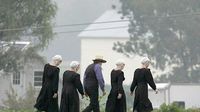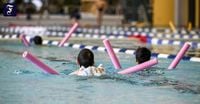In a significant ruling, the Freiburg Administrative Court has determined that children must attend swimming lessons, rejecting a request from parents who sought exemption based on their religious beliefs. This decision comes from a case involving a small Christian community known as the Palmarian Church, whose members adhere to strict clothing rules that they argue conflict with participation in swimming activities.
The case was brought before the court by a couple from the district of Tuttlingen, who argued that entering a swimming pool would constitute a mortal sin. The 36-year-old mother, during the court proceedings, stated, "I would already commit a mortal sin when entering the swimming pool," emphasizing the church's stringent dress code that prohibits swimwear. She added, "The catechism states that swimwear is not allowed." This reflects the deep convictions held by members of the Palmarian Church, which is based in Palmar de Troya, Spain.
The legal dispute began in 2021 when the couple’s children were enrolled in a Grund- und Werkrealschule, but it was revealed during the hearing that two of the three children involved are no longer attending the school, rendering those cases moot. The remaining child, however, remains a focal point of the parents' challenge against the Baden-Württemberg school administration.
During the court hearing, the parents explained that their children participate in other school activities, including sports, but outside of school, they are restricted to interacting only with peers who adhere to the religious community's guidelines. This means that their daughter must wear long-sleeved and high-necked clothing, in accordance with the community's beliefs.
The presiding judge, Gabriele Kraft-Lange, acknowledged the complexity of the case, stating, "Here, fundamental rights are in conflict." The court's decision underscores the balance between individual religious beliefs and the educational requirements mandated by the state.
While the court has yet to release its written reasoning for the decision, which is expected to take at least two weeks, the couple has a month to file an appeal. Should they choose to pursue this route, the case would be escalated to the Administrative Court of Baden-Württemberg in Mannheim.
The Palmarian Church, often referred to as a sect in various media outlets, is characterized as a traditionalist splinter group that has established its own papacy and Vatican. According to reports from the website katholisch.de, the church has been in existence for several decades and has built a significant cathedral in Palmar de Troya, which serves as its center.
The community's strict guidelines dictate that members should avoid places where there are "shameless displays," which they argue includes swimming pools. The couple contends that even if their daughter were to wear a burkini and swimming socks, it would still violate the church's dress code.
In rejecting the parents' claim, the Freiburg Regional Council had previously ruled that the exemption from swimming lessons was not warranted, a stance that the court has now upheld. This ruling raises important questions about the intersection of religious freedom and state educational policies.
As the court prepares to issue its written judgment, the parents remain hopeful that they can continue to advocate for their beliefs while navigating the complexities of the legal system. This case not only highlights the challenges faced by families with strict religious beliefs but also the broader implications for educational institutions in accommodating diverse perspectives.
In summary, the Freiburg Administrative Court's decision reinforces the requirement for children to participate in swimming lessons, setting a precedent for how similar cases may be handled in the future. The outcome of any potential appeal will be closely watched, as it could influence the ongoing dialogue surrounding religious freedom and educational mandates in Germany.






